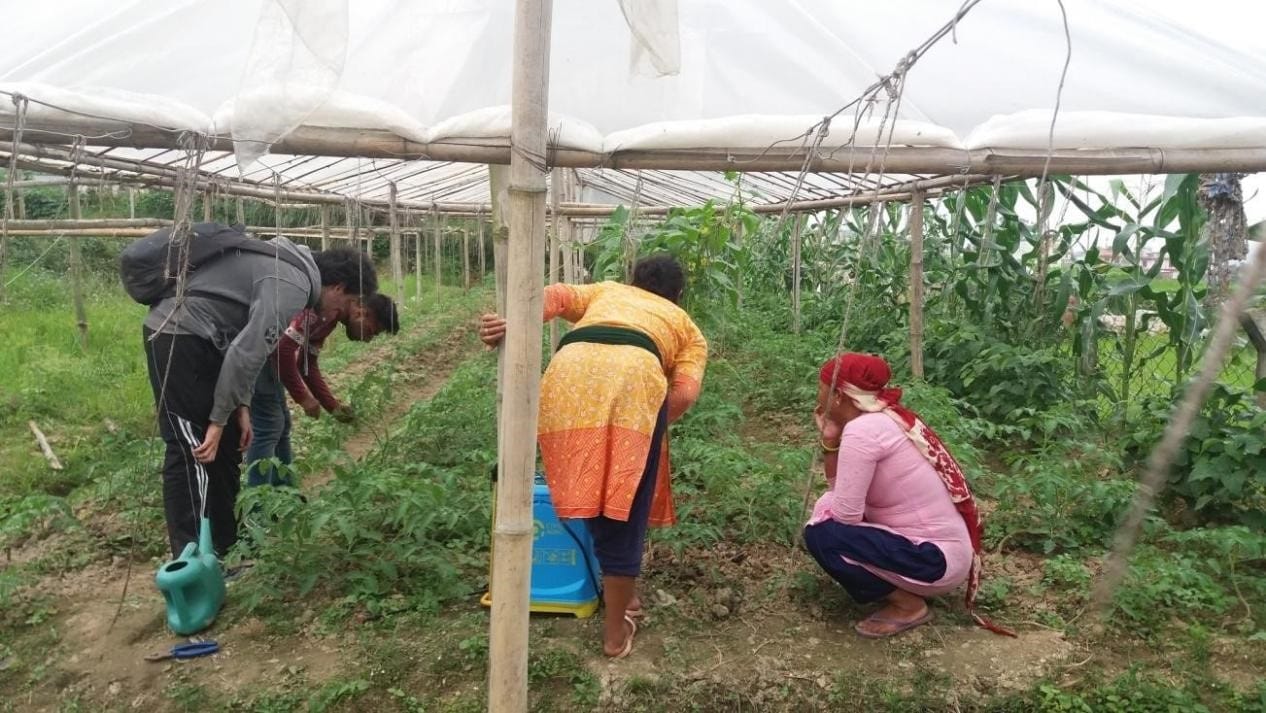Permaculture for Sustainable Livelihood and Food Production
Agriculture Volunteer Opportunities are extensively for sowing, irrigating, and harvesting crops. It is all in a day’s work for farmers. However, Nepalese farmers, in particular, face more considerable challenges when it comes to these tasks to obtain successful crop yields. In addition to an increasingly warmer climate which receives less rain over the year, harsh and infertile terrain gives Nepalese farmers more significant obstacles to secure consistent food production and a positive economic outlook.

Due to the multitude of challenges that Nepalese farmers face in maintaining successful crop cultivation, the need for a holistic approach has become more prominent. Permaculture is a sustainable Agriculture Volunteer Opportunities approach that addresses all the challenges that farmers face. Permaculture technology allows farmers to sustain and maintain themselves and their communities.
The dawn of sustainable Agriculture Volunteer Opportunities in Nepal
Volunteer Initiative Nepal (VIN) has been implementing a successful permaculture project to address Nepalese farmers’ agriculture challenges.
By closely studying the socio-economic and ecological situation, VIN has chosen to introduce the concept of permaculture to rural areas of Nepal. Permaculture aims to work with the natural principles of the land to increase crop yields organically. The main benefit of permaculture is its holistic approach that seeks to maximize output by developing mutually beneficial properties within local ecosystems.
Permaculture seeks to integrate local ecosystems, including specific soil types, local insects and animals, available water and land exposure to sunlight. By considering all the natural elements, the farmers plant different crops that complement each other and boost Agriculture Volunteer Opportunities output.
The most significant benefit of permaculture is that it allows for a year-round crop yield by planting crops following different seasons. Using permaculture technology, the farmers may harvest a large variety of produce throughout the year, which provides communities with good nutritional value and food security.
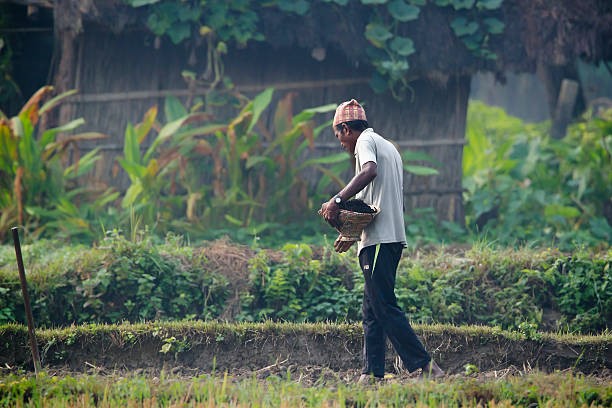
Permaculture – Addressing the more extensive
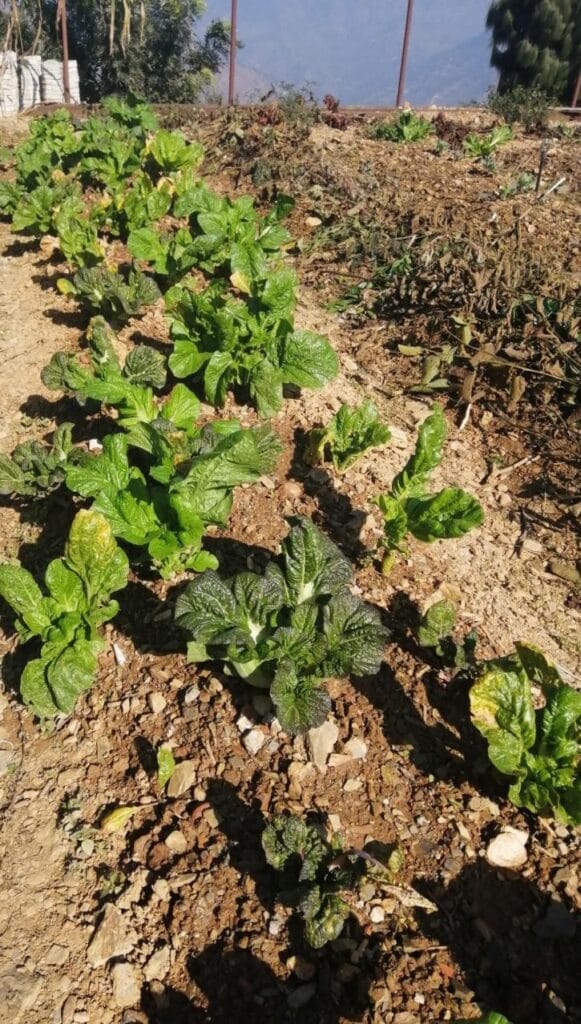
Permaculture seeks to improve the health of local communities through increased food production, simultaneously providing the capacity for economic growth while stimulating the adaptation of sustainable farming techniques.
Goals related to Agriculture Volunteer Opportunities
These three goals, in effect, aim to provide sustainable food security for farmers, allowing local economies to develop through sustainable methods. Considering environmental preservation Permaculture creates a proper path towards sustainable economic development.
These combined goals align with four UN sustainable development goals, which, are aimed at:
- Diminishing hunger.
- Promoting health and well-being.
- Aiding in economic growth.
- Promoting sustainable production and consumption.
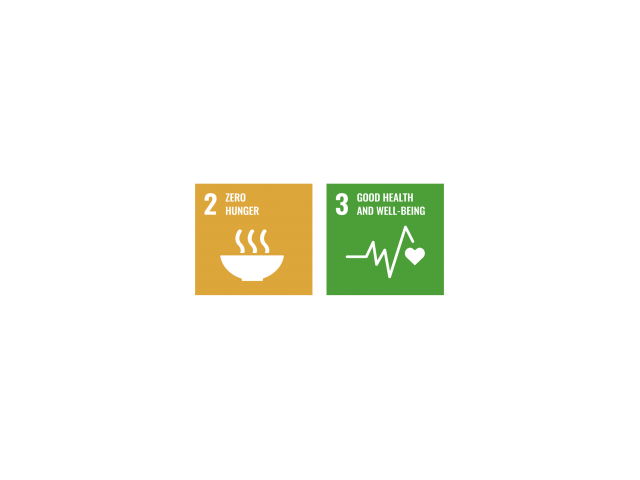
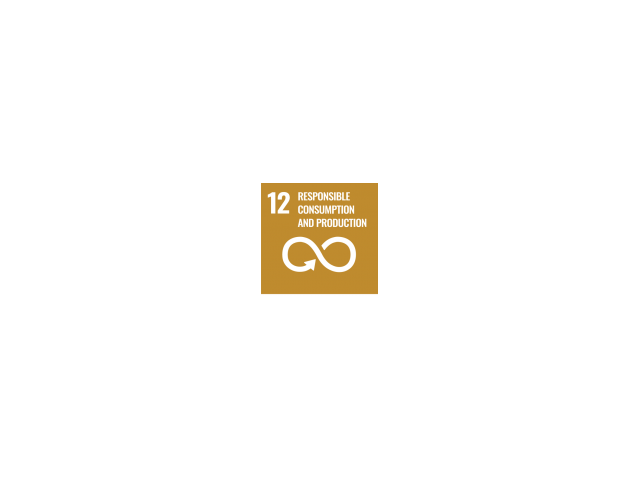
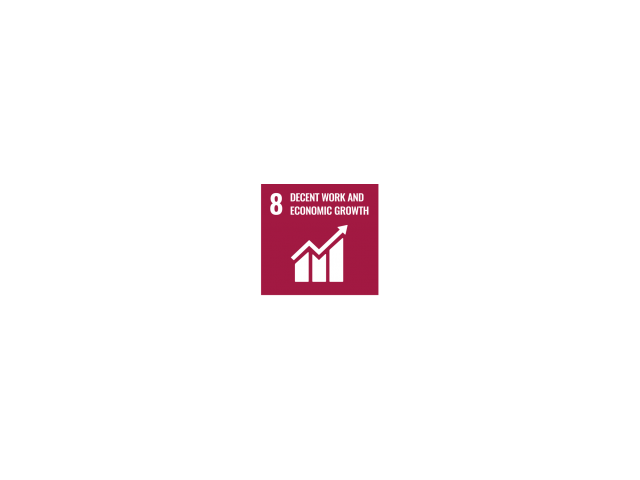
Sustainable livelihood and food production program (SLFP)
The introduction of permaculture in rural areas of Nepal is part of VIN’s sustainable livelihood & food production program (SLFP). This program consists of a seven-year plan to improve the livelihoods of 1800 rural farmers within the Okhaldunga district.
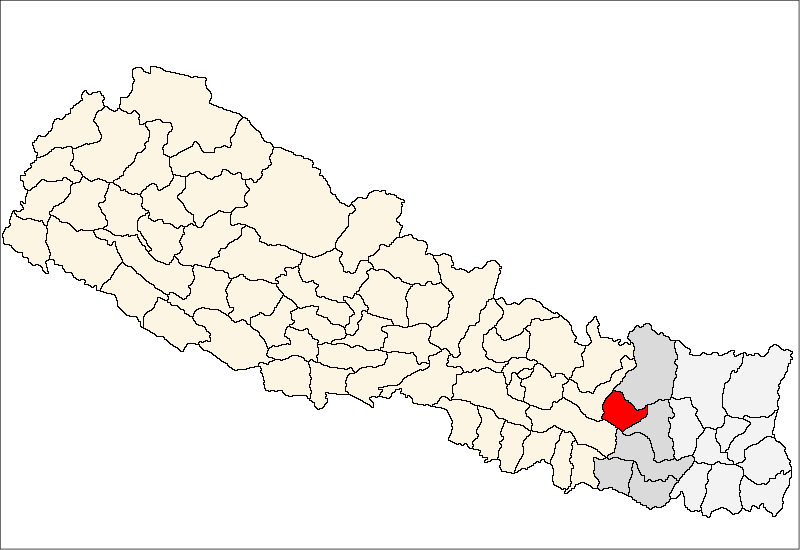
Having a set goal allows us to track and see the progress of introducing permaculture within rural communities. The SLFP program not only aims at introducing permaculture as a standalone method but also pays attention to related infrastructure developments and capacity building of farmers through education.
With the help of local and outside volunteers and a steady flow of shared knowledge and experience, VIN expects significant progress in developing sustainable agriculture within the district of Okhaldunga in the coming years. The SLFP, as a result of this, serves a strong blueprint for the future deployment of permaculture in other agricultural areas within Nepal.
From monoculture to permaculture – Agriculture Volunteer Opportunities
Despite the early stage of the project, the results seem promising. The introduction of Permaculture has provided farmers with a new integral way of delivering a large crop variety whilst maintaining the production of fully organic produce.
One of the most potent benefits of Permaculture is that it enables farmers and families to grow crops on owned land formerly deemed infertile or unsuitable for agriculture.
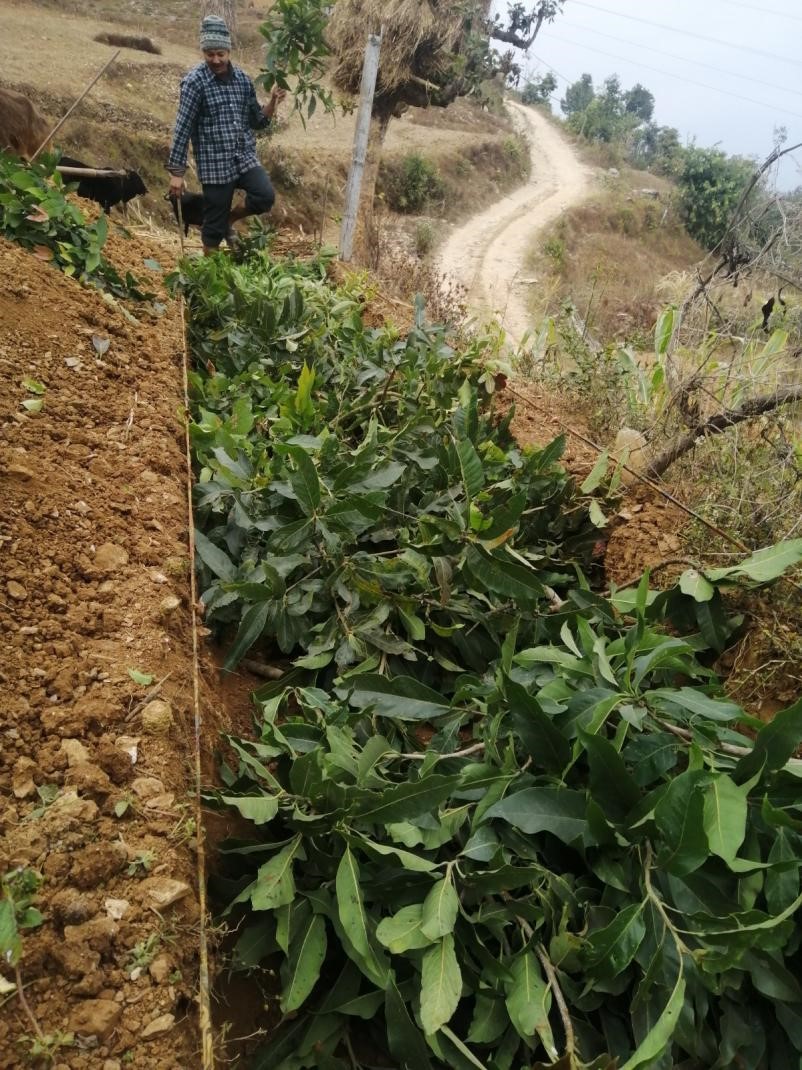
Making infertile land fertile again sounds like a challenging endeavor. However, it has become possible by placing organic materials underground and using a compost layering technique. VIN has introduced permaculture in many rural areas of Okhaldhunga to families and farmers alike.
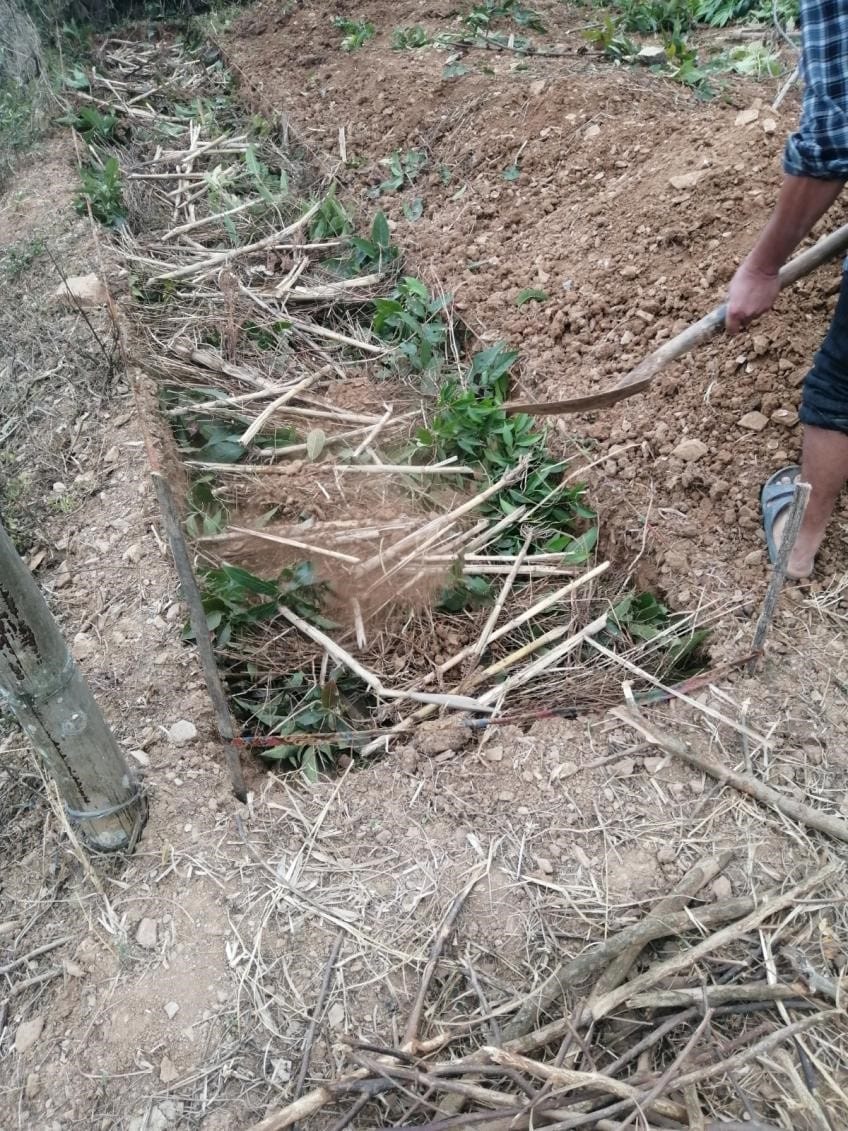
Utilizing Permaculture alongside traditional monoculture allows farmers to decrease their dependency on one crop. Permaculture makes farmers more resilient to potential food shortages and malnutrition due to land degradation or failed harvests. Additionally, it allows farmers economic diversification of their crop production, which opens the door to agro-based enterprise development.
These positive qualities of Permaculture have already attracted much attention from farmers. Moreover, implementing Permaculture is easy, and an increasing number of farmers are gradually choosing to utilize Permaculture as a supplementary cultivation method in Agriculture Volunteer Opportunities.
Earth care, People care, Fair share
Permaculture’s core principle is working in harmony with nature to create efficient and sustainable food production. In effect, families and local farmers that utilize the permaculture and Agriculture Volunteer Opportunities with learn to conduct themselves harmoniously about their environment.
Recognizing that we are an integral part of nature allows us to build a healthy and sustainable relationship with our environment and neighbors. The connection ensures the health of the individual, community, and environment. In other words, Permaculture is earth care; people care and fair share.

Resilience and adaptation to climate change for Agriculture Volunteer Opportunities
The term climate change is well-known throughout the world. However, only the most remote farmers in Nepal could describe in detail what this phenomenon means for their day-to-day life. Drought has continued to increase yearly through reduced rainfall, so longer dry spells have become the norm. The most devastating effect of this change is the lack of available water, which hits remote farmers the hardest.
This radical climate change means that farmers cannot cultivate crops as quickly as before. With less water available, it becomes even harder to provide adequate means to obtain sufficient yields. The good news is that permaculture also seeks to take these changes in climate into account when it comes to cultivating farmland.
By taking this new shift in climate into account, farmers can utilize strategies to mitigate the effects of climate change to the best ability. Permaculture allows farmers to think about their environments holistically, thereby allowing them to build on the strengths of their environment through local ecosystems. The process makes the farmers more resilient to climate change and will enable them to adapt their work methods to sustain consistent yields.

(Utilizing permaculture to mitigate the effects of climate change)
Current progress with Agriculture Volunteer Opportunities
As we enter the second year of the Sustainable livelihood and Food Production Program (SLFP), we are taking a closer look at the progress.
In the past two years, VIN has invested significant time and energy in developing permaculture farms throughout the Okhaldunga district. A substantial part of the successful development of these farms is related to the construction of necessary infrastructure for the development of local agriculture. VIN has been constructing water tanks and pipeline systems for efficient crop irrigation in its catchments.
Construction of Water Tanks
One of the biggest challenges for farmers Okhaldunga district has been accessing sufficient water throughout the year. Due to long, dry spells, farmers struggle to save adequate water during the year to irrigate their crops consistently. To address this issue, VIN has planned to construct 1800 water tanks by 2028 within the Okhaldunga district.
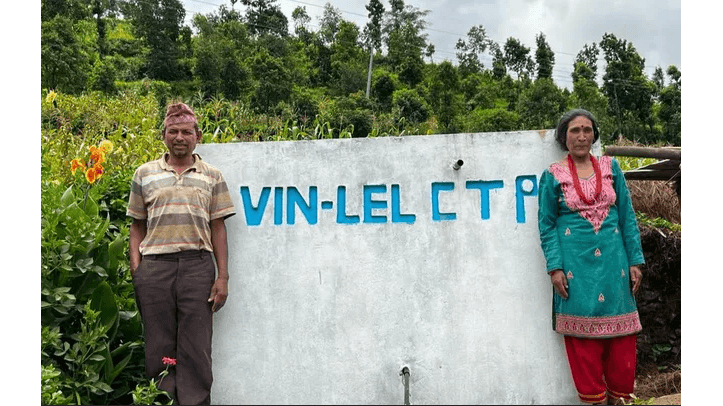
The positive impact of these newly constructed water tanks has been significant. The newly built water tanks have been successfully providing families and farmers with a solid foundation for sustaining themselves and their community by not only providing means of obtaining clean drinking water but also by allowing for the efficient storage of water that can be used to irrigate crops year-long.
These newly constructed water tanks’ positive impact can be observed when you make your way through the Okhaldunga district. When traveling through the community, one can find a significant amount of newly constructed VIN-funded water tanks, which has led to the widespread expansion of Agriculture Volunteer Opportunities activity and food output.
The set goal
Currently, VIN has constructed 38 water tanks with 4000 litres each. The goal is to build one farmer family and one water tank – 1800 water tanks by the end of 2028. Reaching this goal allows for the extensive development of regional permaculture farms and agroforestry projects within the Okhaldunga district.
The sustainable approach of permaculture also inherently promotes the efficient use of water for crop irrigation. This means using the least amount of water to obtain maximum crop yields. Strategies such as deepened crop bed trenches, mulching techniques and drip irrigation are utilized to maximize water use efficiency and recharge local water reserves.
Within the coming years, work will continue building more water tanks and reaching the set goal of 1800 constructed water tanks. To reach this goal, incoming funds are currently set aside to achieve the necessary funding goal for the construction of these water tanks. The structure of these water tanks facilitates the large-scale adoption of permaculture.
Training farmers on utilizing permaculture techniques
A significant driving force in adopting permaculture is utilizing effective training methods. The training enables farmers to quickly learn and implement permaculture techniques on their available lands. Training farmers on the concept of permaculture involves the following three main aspects:
- Education,
- Hands-on assistance
- Follow-up support
Currently, multiple farmers have already started with the application of permaculture. As time goes on, we see an upward trajectory in adopting and applying permaculture. The technology adaptation is mainly attributed to the growing interest that sparks community members by noticing the benefits permaculture brings to early adopters.
With an eye on the future, VIN has also created a permaculture learning garden constructed within the centrally located Naratika Community Learning Centre (CLC). Young students can be introduced to the permaculture concept here and directly apply new agricultural techniques by collectively working in the garden.
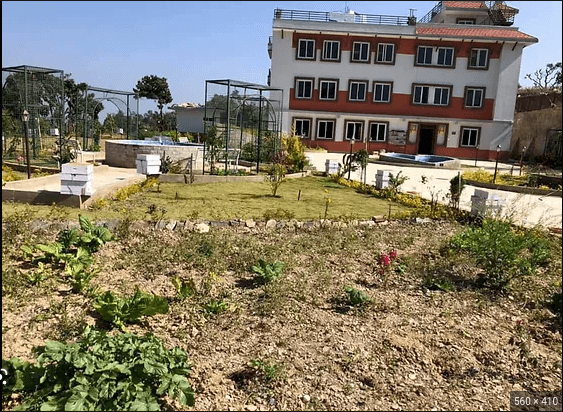
Another critical factor in successfully implementing permaculture and Agriculture Volunteer Opportunities is the provision of hands-on assistance and follow-up support. With international volunteers, VIN has designated teams to visit local farmers and community members to educate them about permaculture and provide them with the necessary practical assistance.
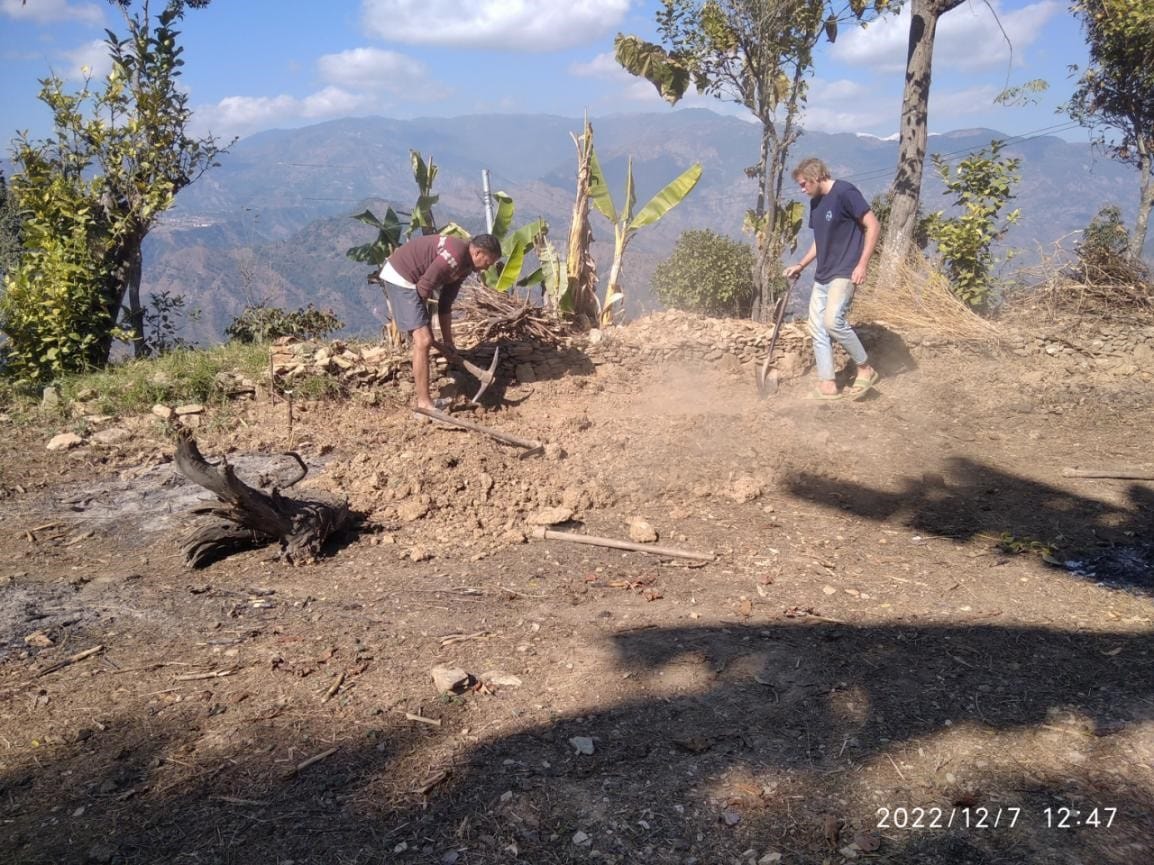
In this process, farmers receive information on how to utilize permaculture most effectively on their lands. The farmers also receive support in designing permaculture farms, digging, preparing permaculture bed-raise, and preparing seasonal calendars. Finally, farmers will be monitored on their progress after receiving aid and provided with follow-up support when necessary.
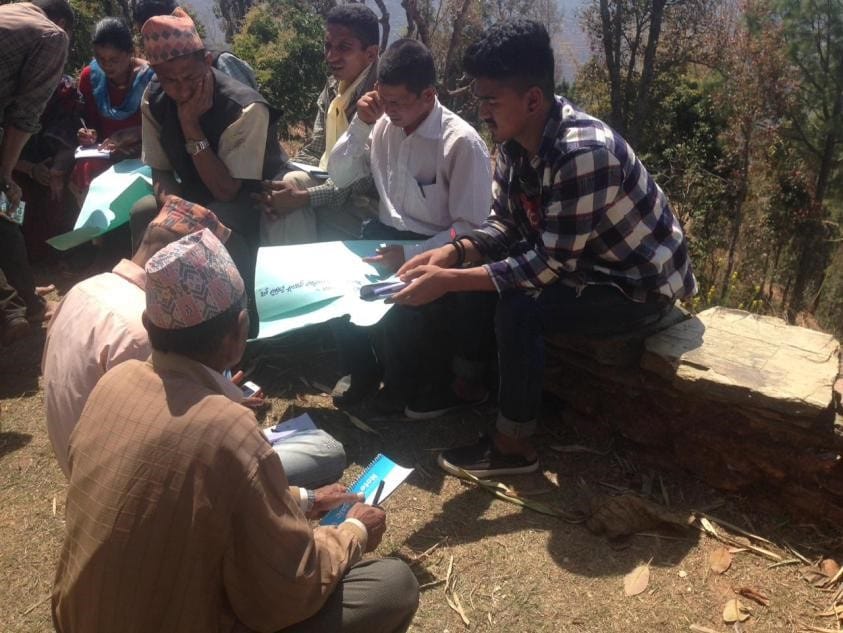
Designing and implementing Permaculture
Permaculture is about understanding and efficiently working with local ecosystems to maximize food production whilst supporting the environment. The first step in this process is observing how local ecosystems function to interact with them and obtain a surplus yield efficiently. Using permaculture methods, we make nature work for us.
Permaculture has 12 principles that provide a clear blueprint for sustainable food production. These 12 principles consist of the following:
- Observe and interact
Understanding how the different elements in nature complement each other helps to understand and maintain a self-sustaining food production chain. Livestock, for instance, produces manure which provides nutrition for crops; these crops then again provide food for the livestock etc. Understanding how elements within an ecosystem interact allow for effective interaction with nature.
- Catch and store energy
Understanding how energy is created and stored within nature helps to produce biomass from crops, plants and trees. This method can transform energy into food and medicine and provide clean air.
- Obtain a yield
Creating an efficient and self-reliant ecosystem produces a surplus of food, provides plant medicine, stimulates efficient water use, and promotes bio-diversity. We can scale up a self-sustaining ecosystem to fit the needs of a community. By doing so, permaculture food production can always meet specific demands.
- Apply self-regulation and feedback
Within Permaculture, it is crucial to take consequent moments to observe how an ecosystem is functioning to understand where to implement improvements. This also forces us to think about our role within the bigger picture of our environment to improve our relationship with nature and maximize yield efficiency.
- Use and value renewables
Using energy sources such as the sun, wind and water makes it possible to grow food and regenerate our environment without causing pollution. This allows for an ecosystem that is waste-free and can always re-capture and utilize the energy we put into crop production.
- Produce no waste
A perfect ecosystem creates no waste by leaving nothing to waste. Everything has a specific function within an ecosystem. Maintaining this holistic approach can build a healthy and sustainable relationship between ourselves and our environment.
- Design from patterns to details
When designing a permaculture farm, it is paramount to always look at area-specific characteristics. From these characteristics, intelligent designs can be created which mitigate risk factors for crop failure and maximize crop yields.
- Integrate, don’t segregate
Every natural element available should be considered integral to the bigger picture. Every animal, microorganism and plant should therefore be regarded as a valuable part of an ecosystem to understand natural symbiosis. Only through inclusion, maximum efficiency can be obtained.
- Use small, slow solutions
Permaculture is about building efficient and long-lasting food-producing Agriculture Volunteer Opportunities systems. In practice, designing the farm layout and planting new crops takes time. Every step takes consideration, but the result will be significant as it will produce a sustainable and consistent yield.
- Use and value diversity
Ecosystems function best when filled with many plants, animals, and microorganisms. Therefore, promoting diverse crops allows for an ecosystem that is both resilient to crop failure and productive by design.
- Use Edges and Value the Marginal
Finding the places within nature where different plants, wildlife and insects interact with each other is of value in understanding how nature creates new ecosystems. We can create new and more proficient agriculture by valuing newly created ecosystems while stimulating biodiversity.
- Creatively use and respond to change
Change is a natural phenomenon, like the symbiotic relationship between different elements. Instead of rejecting change, it should be embraced and used to our benefit. By observing changes objectively, we can use these changes to our advantage and increase crop yields while stimulating the sustainable development of our environment.
Advocacy and promotion of Permaculture
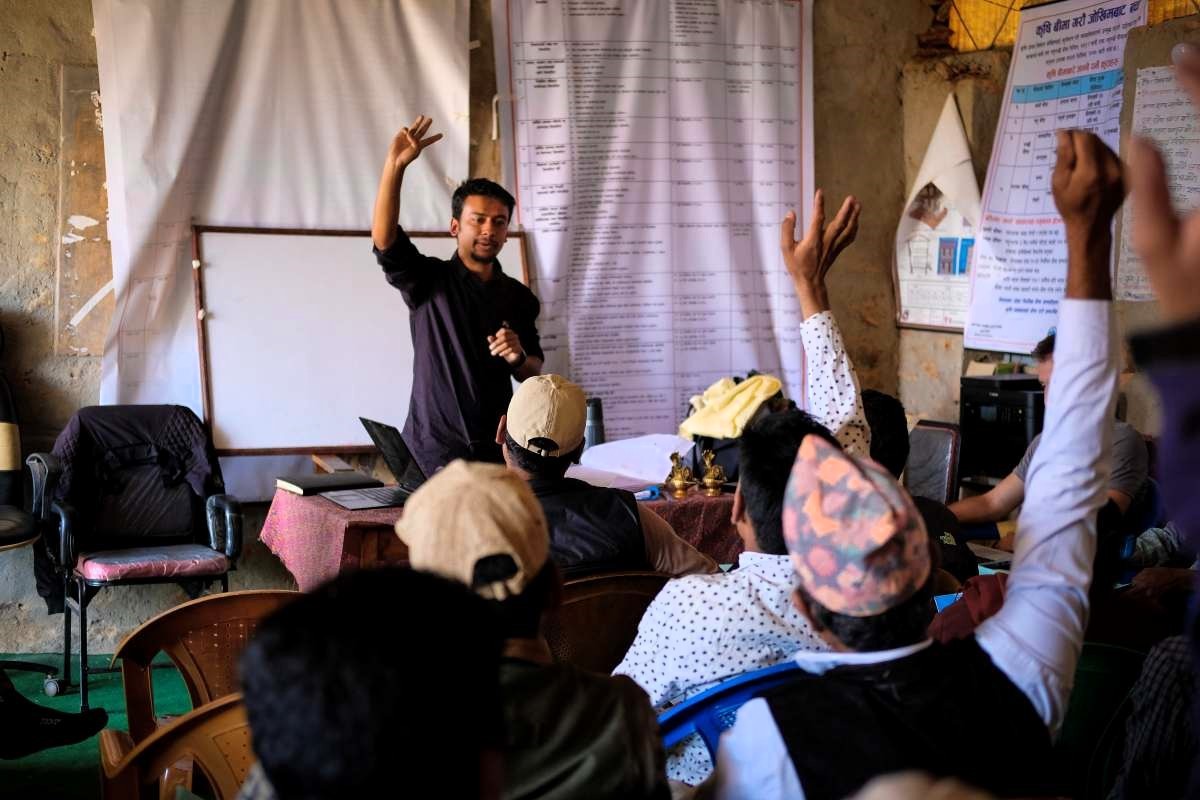
Farmers and community members must become familiar with the concept to promote Permaculture effectively. To accomplish this, we regularly send out Agriculture Volunteer Opportunities to educate farmers and families on Permaculture. Plenary sessions are also held to provide in-depth information on Permaculture. Within these sessions, farmers can ask all their questions related to Permaculture.
Additionally, to make the implementation of permaculture more accessible, we also focused on providing valuable tools that provide an easy and accessible introduction to the topic of permaculture.
Permaculture Calendar
After further evaluation, the decision was made to create a permaculture calendar. This calendar has been specifically designed to match the seasonal conditions of local districts. The calendar provides an apparent oversight in the crops that can be planted throughout the year.
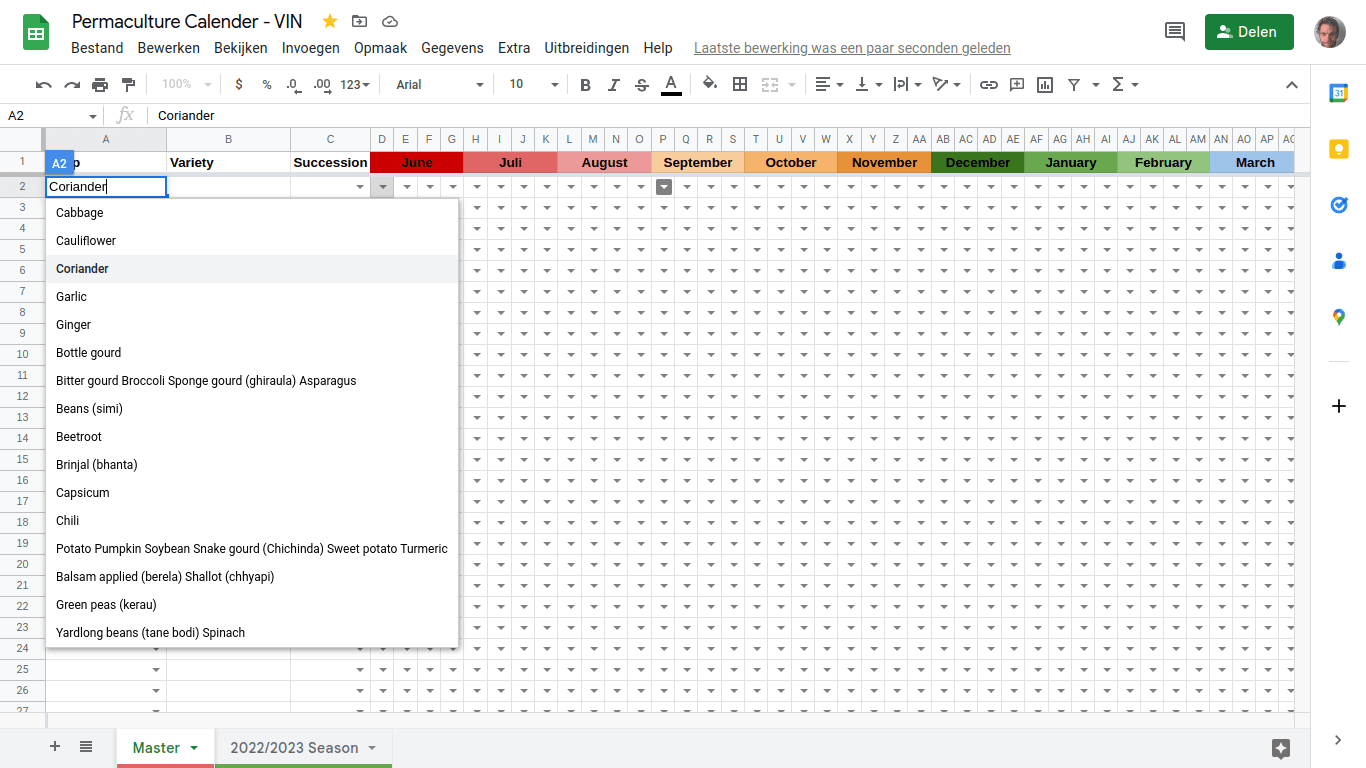
Currently, VIN has finalized a calendar in digital format for the farmers. The next step is to process the digital calendar into a physical calendar with clear illustrations that provide clear instructions on planting crops in correlation with the different seasons.
Ongoing community work and practical tools will provide a strong driving force in creating awareness about permaculture within local communities.
Creating new jobs and economic agro-based opportunities
The introduction of permaculture also allows farmers to expand and diversify their agricultural output. Through this development, we also assist farmers in increasing their agribusiness. To help farmers bring their products more efficiently to market, we provide them assistance in the following three areas:
– Production
– Processing
– Marketing
On the production side, we educate farmers on how they can employ permaculture to create substantial seasonal yields. Subsequently, we instruct farmers process their crops to provide products that fit the market demand. Finally, we help farmers to market their products effectively so that they can reach markets more effectively and drive sales off of there to produce.
Establishing farmer cooperatives
Another essential step in the development of agro-based enterprises is the establishment of farmer and Agriculture Volunteer Opportunities cooperatives. These cooperatives allow farmers to collectively produce specific crops and facilitate the marketing of their products. Trade connections are also established between cooperatives and create markets across Nepal.
